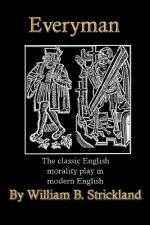|
This section contains 7,896 words (approx. 27 pages at 300 words per page) |

|
SOURCE: Munson, William. “Knowing and Doing in “Everyman.” Chaucer Review 19, no. 3 (1985): 252-71.
In the following essay, Munson examines Everyman in terms of the play's dramatic rhythm in which the main character alternates between learning something and then acting on that knowledge.
Until recently criticism has stressed the dramatic distinction of Everyman more than thematic reasons for its atypicality as a morality play.1 A recent reading, however, argues for a special connection of the play with Bernardine humanism, in which man is “an active agent in the work of his own redemption”:
The playwright, like Bernard, does not characterize his penitent's acquisition of knowledge as a passive acquiescence to a force imposed from without, but as the logical fruition of an internal probing, a psychologically intelligible ascent through three successive stages of augmented understanding.2
In the Castle of Perseverance, by contrast, man is saved at the last moment by...
|
This section contains 7,896 words (approx. 27 pages at 300 words per page) |

|


